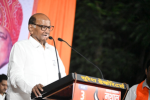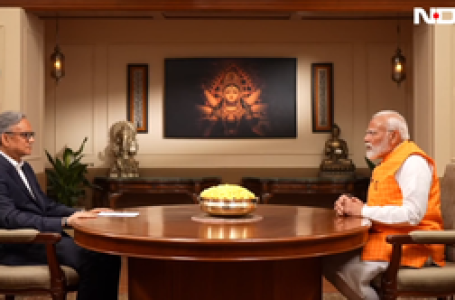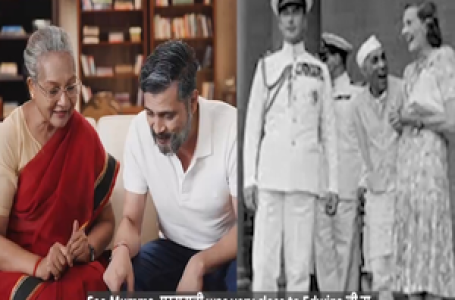
By Vishnu Makhijani
New Delhi : Its a scholarly work that grew out of the inherent curiosity of Manoj Kewalramani, one of Indias foremost analysts studying Chinese politics, foreign policy and approaches to new technologies. Not only does it examine threadbare the Communist Party of Chinas approaches to cultivating sources of strength and exercise of power in a post-pandemic world, but also contains forceful lessons for India that the moral or values-based propositions being hitherto followed need to be backed by hard power – economic and military.
“The idea for the book began to take shape in April last year. I had been following developments related to the outbreak of COVID-19 in Wuhan very closely, and as the city reopened after over two months of lockdown, it was evident that something really historically significant was taking place,” Kewalramani told IANS in an interview of his book, “Smokeless War — China’s Quest for Geopolitical Dominance” (Bloomsbury).
“Countries around the world were imposing lockdown restrictions while China had seemingly contained the spread of COVID-19. It had also started exporting key health supplies, and a political and narrative slugfest around issues like the virus’ origins, the early failures of the Chinese leadership, the role of the WHO, China’s mask diplomacy, and supply chain vulnerabilities was taking shape,” he added.
The book is an attempt to document and understand the extraordinary events of 2020 and their implications for the future of the world order. It examines the Chinese leadership’s political, diplomatic & narrative responses during the pandemic and addresses key questions about the nature of China’s rise and what it means for the world.
Kewalramani’s assessment is that at the present moment, with the US gradually stepping back as the world’s policeman and shifting focus from the Atlantic and Europe to the Indio-Pacific region, it doesn’t appear that China will steer toward “greater discretion and judiciousness in terms of its use of power and home and abroad” but that Cold War 2.0 as envisaged by some experts, is not a possibility. What then does the ‘new normal’ have in store?
“From my point of view, we are at a particular inflection point in the history of the international order. The Communist Party believes that the world is going through unprecedented and volatile changes. Yet, it views China as an indispensable global power, and has immense confidence in the resilience and ability of the Chinese system of governance. In contrast, it views the liberal democratic governance systems as having become stagnant and struggling to address social, economic and political fissures.
“In particular, it views the US as a declining power. All of this means that in the eyes of the Chinese leadership, China still enjoys a window of strategic opportunity to move along the path of national rejuvenation. In essence, this means there will be greater willingness to engage in contestation. And that’s what we are likely to see in the near future, with China being more risk-tolerant in its exercise of power,” Kewalramani explained.
The challenge for Beijing is that concerns about its rise and its actions are providing fresh momentum to counterbalancing movements, he said, adding: “These are evident in the upgrading of the Quad, the recent NATO and G7 statements along with discussions about building supply chain resilience, reducing economic dependence on China, and the formation of circles of trust when it comes to core technologies.”
What does this mean for India? After all, India and China set out on their new paths almost simultaneously in the 1950s and India, in fact, held the high moral ground for much of the decade. Where did India falter and can it ever recover lost ground?
“I think it’s important to understand the role of morality or values in international relations. First, power is the core currency in international affairs. In an anarchic world, states seek to expand their power and capacity, which in turn enhances their security. On the other hand, moral or values-based propositions are useful to create a shared set of norms that constrain the use of power and bring order.
“However, in order for any set of values to become shared across a large community of states, these need to be backed by hard – economic and military – power. If this is the case, the norms can acquire greater acceptance and legitimacy, while the state that’s advocating them and underwriting them, in turn, acquires authority,” Kewalramani elaborated.
Looking at the history of China and India’s rise within this context, “it’s clear that the leadership in both countries in the 1950s had very different views when it came to cultivating sources of power. While the PRC focussed on rapidly developing hard power capabilities, the Indian leadership’s approach to international affairs was based on peace and diplomacy. To be honest, neither side really succeeded in these early quests”.
“In the Indian context, there was a gradual shift towards a more realism-based approach that took place from the early 1960s onward, while the PRC grew more insular during the Cultural Revolution. The 1970s were decades of turbulence and re-orientation for both India and China. By the 1980s, both sides were clearly moving towards a more liberal economic policy. China, of course, began its reform process a decade before India’s economic reforms of 1991, and these set the stage for phenomenal growth in both countries. It’s worth noting that in terms of the size of their economies, India and China were around at par at the time.
“However, it is evident that China has done far better than India since then. While India’s record has been patchy and of stops and starts, China has consistently opened up to foreign capital, technology and talent. At the same time, it has focused on policy measures to support local businesses and entrepreneurs, facilitating exports. It has invested in manufacturing, infrastructure and connectivity, which has led to certain negative externalities too, of course. Public spending on education, health and research and development as a percentage of GDP have consistently remained well above India’s.
“Finally, what we also see is that there’s a concerted effort in China to promote the development of an innovation ecosystem that has encouraged commercialisation of research and product development. None of these decisions have been taken without internal political wrangling and costs. But the Party leadership persisted with the direction of reform. Importantly, the wealth generated from this rapid economic growth has also been directed towards rapidly modernising the military. It is with this capacity that China is now seeking legitimacy and authority,” Kewalramani maintained.
Noting that today, there is tremendous economic asymmetry between India and China, he said bridging this gap will require India to begin focussing on capacity development and avoid the tendency to be insular.
“To be prosperous, India needs to adopt economic freedom as a principle guiding policies and pursue deeper connections with the outside world. Finally, I’d like to say that too often, Indian politics has been about addressing grievances of the past. If we wish to compete in the 21st century, our discourse needs to focus much more on the issues of the future,” Kewalramani concluded. IANS



















